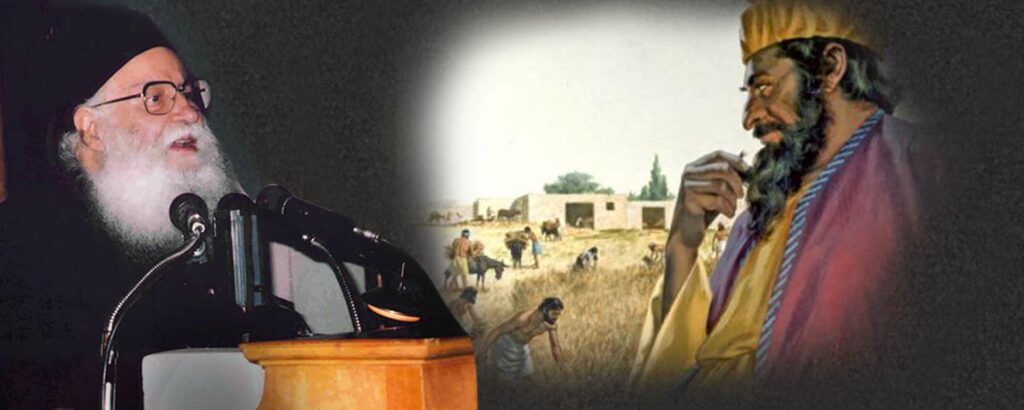
AM I PERHAPS FOOLISH?
THE PARABLE OF THE RICH FOOL
AM I PERHAPS FOOLISH? - The parable of the Rich Fool - Fr. Athanasios Mitilinaios
Ninth Sunday of Luke (Luke 12:16-21), Homily Β387
It is a heavy thing for God to characterize you as foolish, my beloved. God praises a man when he is correct, as God wants him to be, but gives the heavy characterization when a man has left the road of doing His will. This He makes clear in the parable of the rich fool which we heard today, beloved, in our gospel passage.
In this parable, the Lord tells us that a certain man’s field had a bumper crop that year, and He indicates that this man was rich. The man was absorbed in thought. He was thinking where he would store his new crops. Do you see? Another care to think about. (You also see the poor having cares. Both the poor and the rich have cares. The one says: “How am I going to eat today?” The other says: “I have so many choices; what am I going to eat today?”) However, the rich man does not think to give away some of last year’s crop to the poor, but decides to gather together whatever he has and store it in new barns.
The characteristic of the rich man in the parable is dreadful self-love, love for himself. This is shown by his manner of speech throughout the parable, by the repetition of “my”. What does he say? “And I will gather up all my fruit and my grain, and I will say to my soul, ‘Soul, you have much good stored up for many years; relax, eat, drink and be merry’” (Luke 12:18). Do you see? “They are my goods. They are mine.” He did not consider how others were doing, only how I am doing, how I will live well. Not a single thought of giving to the poor, to his neighbor who might presently be in need.
The night on which he had these thoughts of greed, God appears to him in his sleep and says to him: “Fool, tonight your soul is demanded of you (By whom? The demons.); all that you have stored up, whose will they be?” The voice of God is fearful, my beloved. It is fearful also to be called “fool”. God called him “fool”... Can we truly comprehend God saying this to us? Can we comprehend what this means? What is a “fool”? He is the opposite of the prudent man. Foolishness is the opposite of prudence. He is someone without understanding, not prudent. He is foolish. [The word in Greek for foolish, άφρων (ahfron), is composed of the prefix ά- , which negates, and φρήν/φρενός “thinking”, hence “not thinking”, without prudence, foolish.]
It is known that there are four cardinal virtues for man; every other virtue arises from one of these four. (I have spoken many times about these four cardinal virtues in other homilies. It’s ok if we talk about them again, because a homily is not a flowery talk, but a lesson, a catechism; and school teachers say that repetition helps one remember something permanently.) So then, the four cardinal virtues are prudence, temperance [self-control], courage and justice. We also find these virtues mentioned in the Fourth book of Maccabees, verse 18: “There are four kinds of wisdom: prudence, justice, courage and temperance”. We must also say that these four cardinal virtues are found in the wise Ancient Greeks.
Prudence corresponds to thought, to the mind. Those who are prudent use their mind; temperance corresponds to feelings, the heart; courage corresponds to the will; and justice (also called discrimination), on the other side counterbalances the first three. When we say justice, we all think of a scale. The symbol of justice is the scale. It is these, I repeat, which are in equilibrium: prudence, temperance and courage. What does “counterbalance” mean? For one not to be very large and another very small, as with an right triangle, where one leg, prudence for example, is very long and another, courage, is very short. You may have a strong mind and understand many things, yet have no courage. So the virtue of justice counterbalances the other three other virtues, and balance is achieved. This is very very important.
And now we see how foolishness appears, which is what the passage we heard today is about. The delusion “happiness is found in abundance” is created. “I am so happy! My crops produced abundantly! and I still have so much from last year, even from two years ago. And this year, my, what a good crop!” So then, this delusion is created, a delusion, that happiness is found in abundance, “because if I do not have money, I will die miserable’. (St. John Cassian the Roman mentioned that a certain monk acquired money and stashed it under a plank on the floor of his cell, for if I do not have money, I will die miserable.) It is an expression. “I will die miserable.” Pay attention, I will make a distinction (of course I do not say it to my children): “Children, look, this money I have is for my funeral”; or, “Put this shroud (which they buy from the Holy Land), on me for my burial”. We do not mean this. Far from it. They are in no way related.
Voluntary poverty, willing poverty, remedies this. And this voluntary poverty, the Fathers say, is first on the list of virtues. How did the Lord begin the Beatitudes? “Blessed are the poor in spirit” (Mt 5:3). What does this mean? The poor in spirit are those who are poor from choosing to be poor. They want to be poor. They are not fools. They are not stupid. They are not inept for getting rid of money. Why, then, do they wish to be poor? To attain a goal. That is to say, “because I want to work for the Kingdom of God.” This is also why they do not marry. “I am not inept,,” some will say, “test me a little, to see if I am inept.”
So then, “blessed are the poor in spirit” means those who are poor by a deliberate choice, so that “God’s Kingdom will belong to them” (Mt 5:3). If you were to open the collected works of St. Isaac the Syrian, you will see that the first of 80 or 90 homilies are about voluntary poverty. Why? Because it is the starting point of acquiring all the other virtues. Not that a rich man cannot be saved, of course. However the Lord did say that “it is difficult for a rich man to enter the Kingdom of God” (Mt 19:23), because they are deluded from their possessions, from their wealth.1 And then the disciples said: “Who, then, can be saved?” And the Lord said: “What is impossible for man is possible for God”. Yes, a rich man can be saved, the one who gives to the poor, the one who is charitable, whose wealth does not hinder him, whose heart is not attached to material things.
So then, the one who is greedy, the one who amasses, is proud deep down. He has arrogance, of body. The one who chooses not to fast has arrogance of body, not of spirit. Arrogance of body is to say: “I don’t fast because I want to keep my body healthy”. Whereas fasting humbles the body. That is, I humble my body by giving it ordinary food and moderate portions. Fasting, then, breaks the body’s arrogance. A man’s greediness prompted the Lord to speak the parable of the foolish rich man, in order for the greed to be made manifest. He had the dialogue beforehand, [“...speak to my brother, and tell him to divide the inheritance with me.” (v13)], and this offered the occasion for Him to relate the parable.
And He said: “Be careful; guard yourself from every kind of greed; for a man’s life does not consist of his many possessions” (Lk 12:15). It is the delusion I mentioned, that happiness is found in abundance, which motivates a man to be greedy. He is deluded. What is the right amount? The Apostle Paul tells us: “Reverence with contentment” (Heb 13:5, Phil 4:11, 1 Tim 6:8). That is, “be devout and content with what you have. Limit yourself.” The Apostle Paul says, “If we have food and shelter we have enough” (1 Tim 6:8) (shelter includes the clothes we wear and and our house, the roof over our head). We have food to eat. Glory be to God. We should not want to become one of the rich, because those who want to become rich, from all the deceptions that are required, fall into traps and desires, says the Apostle Paul (1 Tim 6:9)2; they pierce their heart [with many sorrows]. Indeed, the rich man has many cares, many more than the poor man, who is content with little and lives on a day’s wage, with almost no cares at all.
Concerning foolishness, I remind you of the saying, “he wasted the help of riches.”3 “Do other people exist?” Yes, my good man. “Are there also other people?” Do you understand what I am saying? “We have our heating, we have our food, we have our table, our clothes.” How many people are there right now in this cold weather who sleep by a river under a bridge! In Paris, the poor sleep under the bridge over the Seine. In London, the poor sleep under the bridge over the Thames. The poor sleep in half-completed buildings and are hungry. Is this not known to everyone? But concerning the poor we will say, “No one can get through to them, they are mentally ill, they don’t understand anything.” And prudence, this marvelous product of the mind, is completely absent, because we are foolish. So they cannot develop charity and a social conscience.
Moreover, in their foolishness the perception is born that “Everyone will die but me”. Mr so-and-so died. “Eh, he died. I didn’t die.” In this way the delusion is created, that “I am the only one who will not die”. Such a man, the fool, puts death out of mind; for him death doesn’t exist. The rich man in the parable did not figure that he might die one day. “Soul,” he said, “you have goods stored up for many years. Your life is in front of you.” And then the surprise came, “this very night your soul is required of you”. Frightening! The emphasis falls on “this very night”, that is, tonight you will die! It happens to all of us, my beloved, we think we will not die. Pay attention to this if you will... there is, of course, a hidden explanation here: God made man to live eternally, and this is the reason he believes he will not die. So we have here a case of I will not die so I can enjoy all of my goods. The mind says: “You will die. This is logical. Everyone dies.” The heart says: “No, you will not die.”
There is yet another delusion. In their foolishness, they cultivate the destructive perspective that there is no life after death. They say: “Who died and came back to tell us there is life after death?” This perception is clearly the suicide of our existence. There is nothing after? You say nothing exists. Is this not suicide? That is, don’t you think you will end up in eternal punishment and in eternal hell? And yet there are many who wish to think: “There is no other life. Life is food and drink. There is nothing after this life”. This is utter materialism. (On the pedestal, my beloved, of the statue of Sennacherib, the last of the Assyrian kings, is inscribed the same law: “Life is to be passed with whatever food, whatever drink, whatever pleasure”, pleasure meaning erotic pleasure of the body. And it seems that Sennacherib was a very much homosexual. A king... and yet he was wearing women’s clothing in front of the people... A dreadful condition!) We hear this erroneous idea: “It is known that there is no other life”, repeated over and over by the press and by the mass media. “What is there beyond? Nothing. Where will we go? Will we go to the stars? We will go to the stars, I know this. After that, what will we do? Nothing.”
The parable continues with the voice of God saying to the foolish rich man: “That which you stored up, whose will it be?” Hmm, indeed, the heir will arrive and say the old expression: “A problem, death is a unexpected problem” [literally, “bean by bean, then death comes”]. That is, a man saves “bean by bean” in order to become wealthy. “A problem, death is a problem... bean soup for the heir!” The heir takes the entire inheritance and eats it up! Indeed, you gather it up, O man, you gather it, but for whom? For your children? For your nephew or niece? For them to consume it all. You gather bean by bean and they will make bean soup, and eat it all at once. How foolish indeed the man is!
But when he feeds on the food of foolishness, of senselessness, then the monster is born, which is called atheism4. The Psalmist speaks about such a fool in Psalm 13: “The foolish man says in his heart, ‘There is no God’” (13:1). Who says God does not exist? The foolish man. The man with no sense. Yes. The wasting of the mind gives birth to atheism; because nature, which we all perceive, is like an open book, from which we learn Whose Creation it is. And you say, “God does not exist”? You say everything happened by chance? By chance? By chance? Is there any chance of this? And you say everything began by itself? By itself? A spontaneous beginning? That everything began by itself? You are foolish! Someone will say, “But I am a knowledgeable scientist.” You are foolish! You are a senseless man. The absence of prudence, then, leads also to atheism.
The atheist is senseless in every way to those around him. The atheist does not have “a sane mind”. I put “sane mind” in quotation marks, because they are not crazy for the nuthouse, but they are crazy nevertheless. Foolish. Senseless. Because atheism is irrational. Saint Basil the Great says: “God called him ‘fool’ because he was godless.”
And foolishness today, unfortunately, is very widespread. We must bring this out in the open, if we want to be candid. The Psalmist again says: “The Lord looks down from heaven...” (as if peeking out the window from a higher floor. It is a beautiful image) “...upon the sons of men to see if there are any who have any sense, who search diligently for God. They have all gone astray (they all took a wrong turn somewhere), they are altogether worthless [ἠχρειώθησαν], no one does what is good, not even one”, says King David in Psalm 13.
Beloved, the absence of prudence is greatly lamentable. God gave us the mind to always be oriented toward whatever is true, authentic and beneficial. He loves us, and cries out to us: “Accept correction, lest the Lord be angered and you perish from the way of the just,” He says in Psalm 2. What is this “Correction”? It is one of the many names of the second person of the Holy Trinity. Like the name “Wisdom [Sophia, Σοφία]. So then, He says to us: “Seek Christ, lest the Lord be angered, because He is the One who gives us wisdom”. Indeed. In the book of Proverbs we read: “The one lacking sense turns away from Me” (Prov 1:32). The author of Proverbs speaks in the name of Enhypostatic Wisdom. “He who is senseless”, he says, “let him come close to me and acquire wisdom” (Prov 1:23).
What is wisdom? “Knowledge of the Maker,” says St. Peter the Damascene, “and not only to know the Maker, but also for your mind to be watchful. What must I do? What musn’t I do?” And who gives us prudence? The Enhypostatic Wisdom of God. Then we have true wisdom, and not worldly wisdom like the rich man of the parable. Prudence, most importantly, is that which points to the Kingdom of God. Everything else is relative. Never let foolishness, my beloved, rule our heart. Amen.
ΤΕΛΟΣ
ΚΑΙ ΤΩ ΘΕΩ ΔΟΞΑ
- Saint John Chrysostom: “But having said it was difficult [for a rich man to enter the kingdom of heaven, He proceeds to show that it is even impossible, and not merely impossible, but even in the highest degree impossible, by giving the comparison of the camel and the needle.” Homily 63 on Matthew, New Advent [edited]
- “But those who would be rich fall into temptations and snares, and into many senseless acts and desires, which drown men in destruction and perdition.”
- Tertullian: “The endowing of a man indeed with riches, is not an incongruity to God, for by the help of riches even rich men are comforted and assisted; moreover, by them many a work of justice and charity is carried out. But yet there are serious faults which accompany riches; and it is because of these that woes are denounced on the rich, even in the Gospel.” (Against Marcion, Book IV, Chp 15, New Advent)
- [αθεΐα, “a-theist” no-god, godless]



